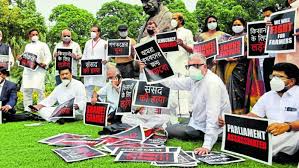Ahmedabad
(Head Office)Address : 506, 3rd EYE THREE (III), Opp. Induben Khakhrawala, Girish Cold Drink Cross Road, CG Road, Navrangpura, Ahmedabad, 380009.
Mobile : 8469231587 / 9586028957
Telephone : 079-40098991
E-mail: dics.upsc@gmail.com

Suspension of MPs
News: Twelve Opposition members of the Rajya Sabha were suspended for the entire winter session for unprecedented acts of misconduct, unruly and violent behavior and intentional attacks on security personnel.
Decorum of the Parliament
• Freedom of speech is one of the most important privileges enjoyed by Members of Parliament.This freedom is circumscribed, however, by the necessity of maintaining order and decorum when debate is taking place.
• Thus discipline, decorum and dignity of Parliament are of paramount importance for the efficient functioning and success of parliamentary institutions.All over the world concerns have been expressed about the decline of discipline, decorum and dignity of legislative bodies.
• MPs are required to adhere to certain rules of parliamentary etiquette.For example the Lok Sabha rulebook specifies that MPs are not to interrupt the speech of others, maintain silence and not obstruct proceedings by hissing or making running commentaries during debates.Newer forms of protest led to these rules being updated in 1989.
• Now, members should not shout slogans, display placards, tear up documents in protest, and play a cassette or a tape recorder in the House.Rajya Sabha has similar rules. To conduct the proceedings smoothly, the rulebook also gives certain, similar powers to the presiding officers of both Houses.
Who can suspend?
• The presiding officer of each House can direct an MP to withdraw from the legislative chamber for grossly disorderly conduct.The MP then has to remain absent from the proceedings of the House for the remainder of the day.The presiding officers can also “name” an MP for “persistently and wilfully obstructing the business” of the House.In such a case, usually, the Parliamentary Affairs Minister moves a motion for suspending the offending MP from the service of the House.The suspension can last until the end of the session.
Way forward:
• The reluctance and procrastination of the treasury benches to face discussions is the main cause for disorder in Parliament.In most cases, disorders in the House arise out of a sense of frustration felt by members due to lack of opportunities to make his point.They are perhaps easier to deal with. What is more difficult to tackle is planned parliamentary offences and deliberate disturbances for publicity or for political motives.
• Debate is central to democracy, and therefore there should be more debate and fewer disruptions.The majority party is responsible for governing and should take other parties into confidence.The Opposition should play a constructive role in Parliament and be allowed to put forward its views and express itself in a dignified manner.
• The presiding officers must help the Opposition in raising issues uncomfortable to the government.

Address : 506, 3rd EYE THREE (III), Opp. Induben Khakhrawala, Girish Cold Drink Cross Road, CG Road, Navrangpura, Ahmedabad, 380009.
Mobile : 8469231587 / 9586028957
Telephone : 079-40098991
E-mail: dics.upsc@gmail.com
Address: A-306, The Landmark, Urjanagar-1, Opp. Spicy Street, Kudasan – Por Road, Kudasan, Gandhinagar – 382421
Mobile : 9723832444 / 9723932444
E-mail: dics.gnagar@gmail.com
Address: 2nd Floor, 9 Shivali Society, L&T Circle, opp. Ratri Bazar, Karelibaugh, Vadodara, 390018
Mobile : 9725692037 / 9725692054
E-mail: dics.vadodara@gmail.com
Address: 403, Raj Victoria, Opp. Pal Walkway, Near Galaxy Circle, Pal, Surat-394510
Mobile : 8401031583 / 8401031587
E-mail: dics.surat@gmail.com
Address: 303,305 K 158 Complex Above Magson, Sindhubhavan Road Ahmedabad-380059
Mobile : 9974751177 / 8469231587
E-mail: dicssbr@gmail.com
Address: 57/17, 2nd Floor, Old Rajinder Nagar Market, Bada Bazaar Marg, Delhi-60
Mobile : 9104830862 / 9104830865
E-mail: dics.newdelhi@gmail.com